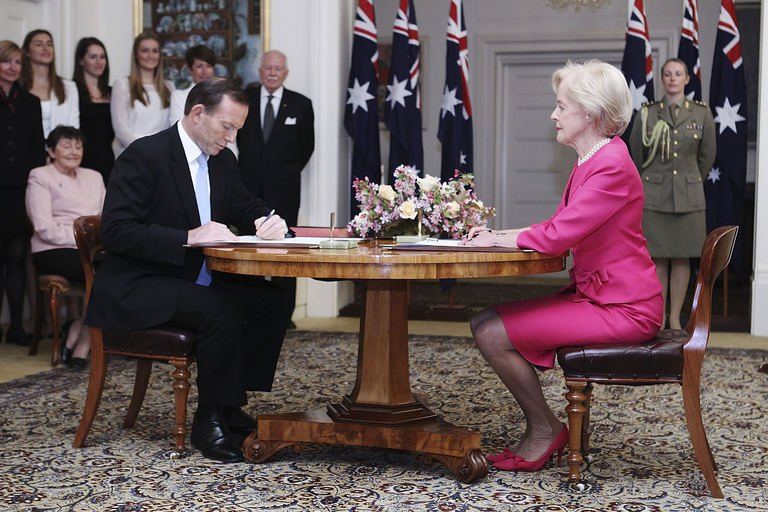
September 27-2013
Tony Abbot was sworn in as Australia’s new prime minister last Wednesday and immediately announced he was moving forward to halt illegal immigration to Australia by boat as one of his two top priorities.
The 55-year-old conservative launched straight into work with a cabinet meeting after the swearing-in ceremony.
“Today is not just a ceremonial day, it’s an action day. The Australian people expect us to get straight down to business and that’s exactly what this government will do,” said Abbott, a hardnosed politician who has worked to soften his macho image in recent months.
Abbott, 55, was elected September 7, ending six years of government under the Labor party.
At the top of his to-do list is axing the unpopular carbon tax, which charges the country’s biggest polluters for their emissions at a fixed price. Abbott, who once said that evidence blaming man for climate change was “absolute crap,” said he would immediately instruct officials “to prepare the carbon tax repeal legislation”.
Another central plank of his election campaign was stopping asylum-seeker boats. The largest nationality group on the boats currently is Iranian.
Abbot outlined plans to stop the boats by: a) buying up the kinds of rickety old fishing boats that are used to bring people from Indonesia to Australia; b) paying Indonesians for information on planned sailings and c) using the Australia Navy to tow boats found at sea back to Indonesia.
His policy of using the navy to tow them back to Indonesia came into effect last Wednesday, and could prove to be an early test of his mettle.
“It’s so important that we send a message to the people-smugglers that, from today, their business model is coming to an end,” Abbott said.
The military tow-back is part of Operation Sovereign Borders, which is widely expected to be led by Deputy Chief of Army Angus Campbell, a former Special Forces commander, reporting directly to new Immigration Minister Scott Morrison. Campbell will be promoted to lieutenant general (three-star) in his new role.
The whole package has received a cool reception in Jakarta.
Acting opposition leader Chris Bowen said the plan would cause problems with Indonesia.
“Mr. Abbott has told us he wants a Jakarta-based foreign policy at the same time as saying to Jakarta we don’t care what you think, this is what we’re doing,” Bowen told Australian Broadcasting Corp. “This is a recipe, frankly, for ongoing problems in relation to boats arriving in Australia. It’s a recipe for ongoing dispute with Indonesia about this issue.”
In addition, people who arrive by boat and are ruled to be legitimate refugees under international law are now being given temporary protection visas instead of permanent visas, meaning even refugees are not to remain in Australia.
Abbott is not changing the previous government’s policy of dumping anyone who arrives by boat on remote Pacific islands while their claims to refugee status are adjudicated, a process that sometimes takes years.
Abbott plans to make his first international trip as prime minister to Indonesia on September 30 to discuss the plan and other issues.
Illegal aliens have been arriving by boat in Australia for decades. But they usually have only numbered a few hundred each year. There was a spurt in 1999, 2000 and 2001 that brought in more than 12,000, but quickly ended. In 2009, a new spurt began, reaching 17,209 in 2012 and on a pace to exceed that this year. In recent months, the illegal arrivals have been 28 percent Iranian, 16 percent Sri Lankan, and 13 percent Afghan. All other nationality groups are under 10 percent.
